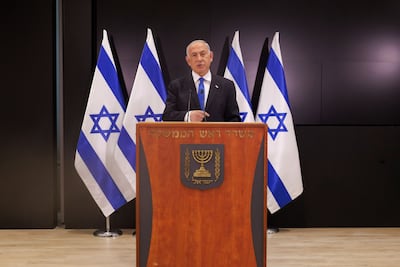Negotiations between Israel's government and the opposition over plans to implement controversial judicial reforms could move Israel towards a "stronger and more resilient [democratic] structure", President Isaac Herzog said.
The two sides are in compromise talks mediated by the president after Prime Minister Benjamin Netanyahu delayed the plans in late March after criticism from his own defence minister and mass protests and a general strike against the overhaul.
In an interview with The New York Times released on Wednesday, Mr Herzog said the negotiations represented "potential for a constitutional moment".
Israel does not have a constitution. Its democracy is instead built on four branches: the presidency, parliament, the ministerial cabinet and the judiciary.
"I’m carrying a certain historic burden on my shoulders ... I’m perhaps the only element in Israeli public life that all parties can feel free to come and speak to and confide with," he said.
The government's judicial reforms include plans to limit the power of the courts – including the Supreme Court – and give the government more control over the selection of judges and legal experts.
Protests against the overhaul have divided the country since the new Israeli government came into power last December.
Every Saturday for three months, hundreds of thousands of Israelis have taken to the streets, with other days of mass action interspersed with the regular protests.
The situation reached breaking point towards the end of March when a general strike and warnings from the country's security cabinet about the overhaul's effects on Israel's safety forced Mr Netanyahu to delay the process until parliament begins its summer session at the end of April.
Defence Minister Yoav Gallant said that Israel's enemies were emboldened by the country's social divisions and mounting threats from Israeli military reservists that they would not turn up to training in protest against the overhaul.

He was later sacked by Mr Netanyahu, although he was never removed from his position. Mr Netanyahu later re-instated him as defence minister after an exchange of rockets fired between Israel and terrorists in Gaza, Lebanon and Syria and a spate of terrorist attacks in Israel and the Palestinian territories last week.
In his interview this week, Mr Herzog reiterated fears that enemies regard the country's internal divisions as a sign of weakness.
The president, whose position is normally largely ceremonial, has been issuing notably intense pleas for dialogue and calm.
In March he released a compromise plan on the reforms. The opposition welcomed the framework, but it was rejected by the government.














